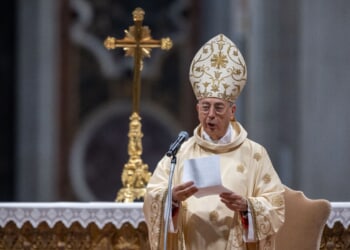The head of the Orthodox Church of Greece accused the Egyptian government Thursday of seizing and confiscating property belonging to an ancient Christian religious site in the Sinai Peninsula and threatening the religious freedoms of the monastery’s monks.
His Beatitude Ieronymos II, Archbishop of Athens and All Greece, was reacting in his statement to an Egyptian appeals court ruling that the Holy Monastery of Saint Catherine of Mount Sinai and surrounding religious heritage sites were part of Egypt’s public domain, although its monks retained the right to use them, the Catholic News Agency (CNA) reported.
Ieronymos slammed the Wednesday ruling as “scandalous,” adding that the Egyptian government “[e]ssentially” decided to “dismantle any concept of law and, essentially, to attempt to single-handedly extinguish the very existence of the Monastery, negating its entire function, its very worship and spiritual work, as well as its cultural one,” according to a translation of the statement.
“The property of the Monastery is being seized and confiscated, and this spiritual Lighthouse of Orthodoxy and Hellenism is now facing a question of real survival,” Ieronymos said, adding that he “unequivocally condemn[ed] any attempt to change the regime, which has been in force in the region for 15 centuries.”
“[T]he world’s oldest Orthodox Christian Monument” was “entering a great ordeal, which harks back to other dark times,” he wrote. The monastery is over 1,500 years old and houses rare Byzantine icons and rare and ancient manuscripts, according to CNA. (RELATED: A Lost Monastery Might Be Hiding Beneath An English Bus Station, Archaeologists Say)
An appeals court in the Egyptian city of Ismailia has ruled that the monks of St. Catherine’s Monastery in the Sinai Peninsula have the right to use the monastery and surrounding religious heritage sites. https://t.co/xQDyrF1chl
— Catholic World Report (@cworldreport) May 30, 2025
Saint Catherine’s Monastery, Sinai, Egypt. Photo dated 9 November 2010. (Wikimedia Commons/Public/By Berthold Werner – Own work, CC BY-SA 3.0, https://commons.wikimedia.org/w/index.php?curid=12215773)
Allegations that Egypt was confiscating the Greek Orthodox monastery appeared to have become a thorny issue between Egypt and Greece, drawing high-level diplomatic responses.
The spokesperson for the Egyptian Ministry of Foreign Affairs said such allegations were “completely unfounded” and could hurt centuries-old “close, fraternal, and historical relations that bind Egypt to the friendly Hellenic Republic,” according to a Friday statement published by the Embassy of Egypt in Athens, Greece.
“[T]his judicial ruling represents the first instance in which the legal status of the monastery has been regulated, with a clear affirmation of the preservation of its sacred standing,” the spokesperson reportedly said.
The ruling also upheld the monastery’s right to continue to use religious and archaeological sites within the area as well as some other sites “for which contracts had been signed with local authorities—despite their classification as natural reserves,” according to the spokesperson.
The ruling stipulated that certain far-flung and uninhabited areas in the natural reserves “for which no ownership or possession documents exist” would be state property, according to the spokesperson.
“The Presidency of the Arab Republic of Egypt reiterates its full commitment to preserving the unique and sacred religious status of Saint Catherine’s Monastery and preventing its violation,” a statement from Egyptian President Abdel Fattah el-Sisi read in part.
El-Sisi also reportedly gave assurances during a trip to Greece earlier in May that the status of the monastery remained protected, CNA reported. Ieronymos also referenced the official assurances in his statement while accusing the Egyptian government of going against the assurances.

![Tulsi Gabbard Calls for Arrest of James Comey Over Call to Assassinate Trump [WATCH]](https://www.right2024.com/wp-content/uploads/2025/05/Tulsi-Gabbard-Calls-for-Arrest-of-James-Comey-Over-Call-350x250.jpg)


![Declaration Gaffe, Whisper Creep, and Conflicting Cancer Claims [WATCH]](https://www.right2024.com/wp-content/uploads/2025/05/Declaration-Gaffe-Whisper-Creep-and-Conflicting-Cancer-Claims-WATCH-350x250.jpg)

![Trump Drops Bombshell Video Linking Clintons to Mysterious Deaths [WATCH]](https://www.right2024.com/wp-content/uploads/2025/05/Trump-Drops-Bombshell-Video-Linking-Clintons-to-Mysterious-Deaths-WATCH-350x250.jpg)
![Bessent Exposes Media Lies About April’s Stock Market Performance [WATCH]](https://www.right2024.com/wp-content/uploads/2025/04/Bessent-Exposes-Media-Lies-About-Aprils-Stock-Market-Performance-WATCH-350x250.jpg)








